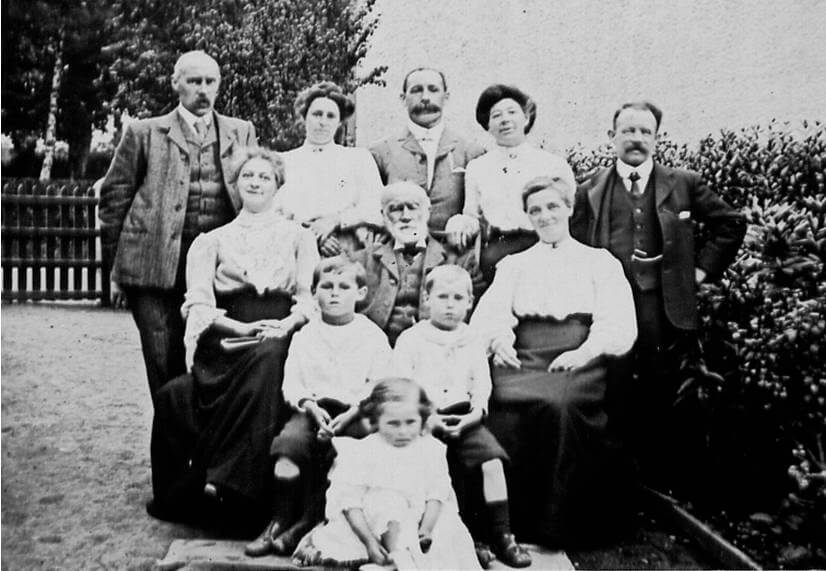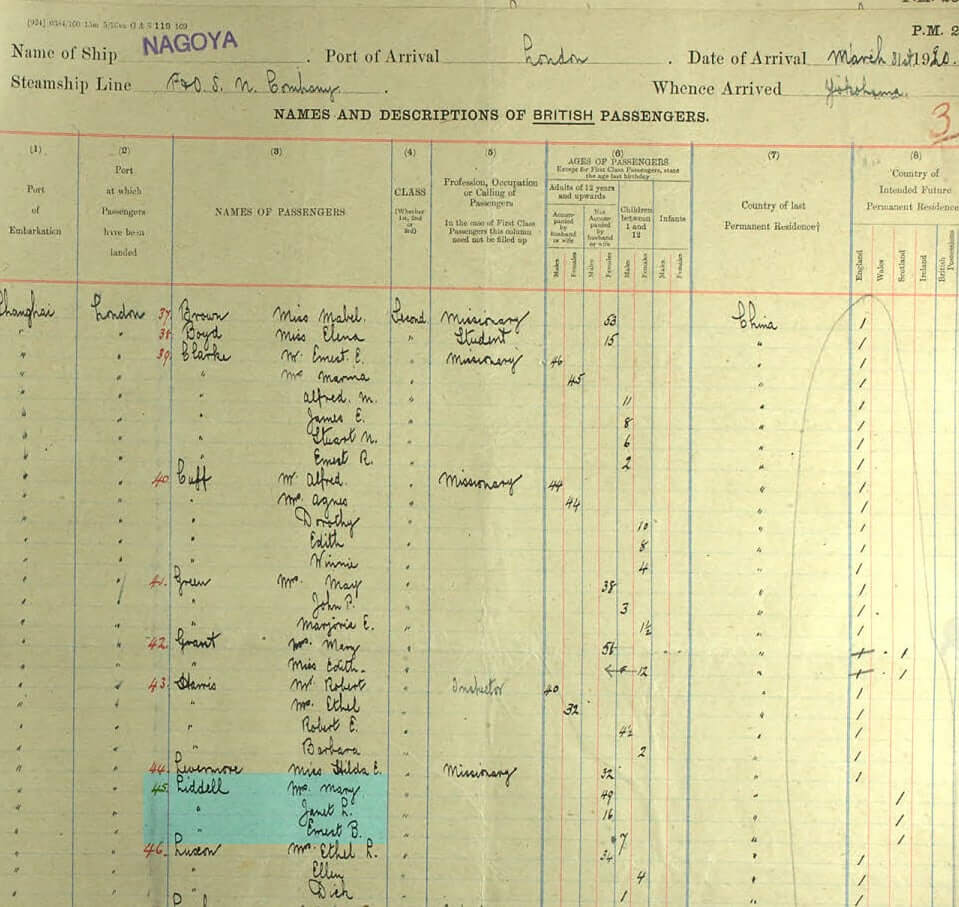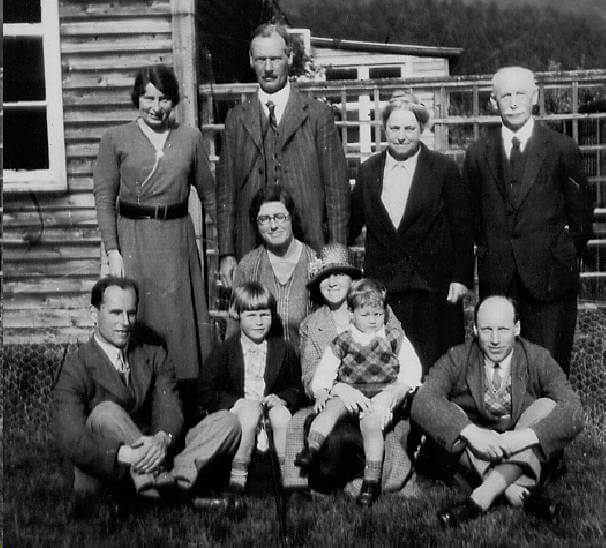
About
Eric Liddell
We are delighted that our charity is named after an inspiring sporting legend, committed missionary and a devoted husband and father, Eric Liddell. The Eric Liddell 100 will celebrate the Flying Scotsman’s outstanding Olympic Success and his legacy.
Eric Liddell
(16 January 1902 – 21 February 1945)
Eric Liddell was an inspirational Scotsman whose short life is remembered and renowned internationally for his accomplishments in many different ways.
Eric was well known for his abilities as a sporting champion and was capped for the Scotland international rugby team seven times. He is one of a rare few who has had his cap reissued and was inducted into the Scottish Rugby Hall of Fame in January 2022, on the centenary of his first international cap. You can read the story here:
In 2002, when the first inductees were inducted into the Scottish Sports Hall of Fame, Eric topped the public vote for the most popular sporting hero Scotland had ever produced.
The champion sportsman is probably even better known for his gold medal win in the 400 metres at the 1924 Olympic Games in Paris.
He has been immortalised in the film “Chariots of Fire” and celebrated in Scottish author and broadcaster Sally Magnusson’s book ‘The Flying Scotsman’ and a number of other books have been written about his life.
The Eric Liddell Community (formerly the Eric Liddell Centre) is honoured to have carried his name since its instigation. It is housed in the former North Morningside Church , one of the four churches situated at the intersection between Colinton Road and Morningside Road in Edinburgh – which gave the name ‘Holy Corner’ used by Edinburgh residents.
Eric lived for a short time in Gillespie Crescent before moving to a house in Merchiston Place both addresses in Edinburgh are close to the former church where the The Eric Liddell Community is now based.
Eric is remembered in many ways to different people – as a sportsman, a husband and father, a devout soul who lived his life according to his beliefs, a graduate of Edinburgh University and a missionary in China who refused to leave those he looked after during the Second World War. If he had lived longer than his forty-three years, who knows what more he could have done.
The Eric Liddell Community reflects Eric’s code of ethics, to help and support those who need it and the people who look after them in a spirit of community, inclusivity, diversity and generosity. His legacy is strong and we embrace the close ties with Eric’s three daughters Patricia, Heather and Maureen who live in Canada and his niece Sue who lives in Edinburgh and is a patron of the Community
Other patrons include Sir David Puttnam CBE, HonFRSA, HonFRPS, MRIA producer of ‘Chariots of Fire’ see link here: educator, environmentalist and former member of the House of Lords and Alexander “Sandy” McCall Smith, CBE, FRSE, renowned British writer, raised in Southern Rhodesia and formerly Professor of Medical Law at the University of Edinburgh.
Sally Magnusson has strong links with the Community as the author of “The Flying Scotsman” and her book “Where Memories Go: How Dementia Changes Everything” about her mother which resonates with The Eric Liddell Community where much of its work is supporting people living with dementia and the people who care for them. Following her experience with her mother, Sally set up the charity Playlist for Life and you can read about it here https://www.playlistforlife.org.uk/
It is in celebration of Eric’s centenary win of his gold medal at the Paris Olympics in 1924 that The Eric Liddell Community has recently launched The Eric Liddell 100, which will include a series of developments that will commemorate Eric’s life and how he lived it.
Who was Eric Liddell?
China
Internment
Death
Legacy





Recollections of Eric Liddell
by Sir Arthur Marshall
The Cambridge University Athletics Club had an invitation from Pennsylvania to take a team of seven to the Pennsylvanian Games in March 1924, and I was one of the seven.
Edinburgh University, the 1923 AAA 100 yards Champion, had been personally invited and travelled with us. We stayed at the very comfortable Pennsylvanian Cricket Club. I am afraid none of, including Eric Liddell, managed to win an event at the Pennsylvanian Games.
We travelled back in a small slow ship of the American United Line called ‘The Republic’ – a ten day crossing. Eric Liddell entered in the fun and games on the boat, including the Fancy Dress Dance. Whilst he was very strict about religion. Eric and I became good friends and saw much of two American sisters, Freddie and Edith, who were travelling to ‘do Europe’, including the UK. They said they were going to be in Paris for the Olympic Games, and we said if we were there at the same time we hoped we could meet.
Harold Abrahams had set his whole life on winning the Olympic 100 Metres – it had become and obsession with him. Liddell’s achievement in winning the 1923 AAA 100 Yards in the record time of 9 7/10 seconds was a devastating blow to Abrahams and shook him to the core. To date Abrahams had been a consistent 10 seconds 100 yards winner but had only slightly broken 10 seconds on one or two occasions. He knew in the Olympics he would be up against overseas competition, particularly from the Americans, but this new and very serious opposition out of the blue and on his doorstep had come at a time when Harold had established his 100 yards supremacy in the UK. To achieve level pegging with Eric Liddell’s new record time, Harold had to improve his performance by two or three yards with the help of his trainer Sam Mussabini. It must have been a tremendous relief to Harold when it became known early in 1924 that Eric had decided to concentrate on the 400 metres and, because of his religious principles, would not compete in the Olympic 100 metres as first heats were always run on Sunday.
Eric had in turn become completely dedicated to winning an Olympic Medal within the restrictions of his faith. He was a famous Scottish international rugger player, and gave up his rugger to enable him to concentrate on his Olympic ambitions, which became very deep-rooted, and his work suffered. Winning an Olympic Gold Medal became a priority, second only to his religion, and the ambition to win this event became part of his religion.
The team travelled to Paris days before the Olympics started and had a big send-off at Victoria Station. The silence at the start of the 100 metres and 400 metres was quite electric. Harold Abrahams won the 100 metres in a new Games record time.
In spite of all that has been said about Abrahams’ 100 metres, the 400 metres in some way provided the greatest thrill of the meeting with the world record being broken by Eric Liddell three times in two days. It was thought that Liddell had some chance of winning, but nobody thought Liddell capable of the amazing performance he achieved in the final. As far as the crowd were concerned they were well informed about Liddell’s dedication to his religion and his refusal to run in the first round of the 100 metres on the Sunday; they also knew of his determination to win this event. The occasion was enlivened by the support given to Liddell by the pipes and drums of the Cameron Highlanders.
The silence and pent-up excitement at the start of the race could be felt. Liddell went ahead at the start and maintained his pace throughout, finishing in what at the time was described as ‘a most lion-hearted manner’ winning by three yards from Fitch, an American. This was probably the greatest achievement of the VIIIth Olympiad, and superlatives were showered on Liddell by the press of the entire world. Liddell was short and not a pretty runner but just pounded along virtually at the same pace all the way, with a finish as if he was making a final dash for a try in a rugger match with an opponent bearing down on him and about to tackle from behind.
After Eric had won the 400 metres Gold Medal, Eric and I made contact with Freddie and Edith, the American sisters, and took them to a Tango Tea Dance in the Champs Elysees.
Footnote: Along with sacrificing his place in the 1924 Olympics 100m, Eric Liddell also gave up two other races in which Great Britain held high hopes of winning gold that year – the 4 x 100m and 4 x 400m, whose finals also took place on a Sunday.
Books Inspired
by Eric Liddell
- Eric Liddell – Pure Gold by David McCasland
- The Flying Scotsman by Sally Magnusson
- In Japan the Crickets Cry by Steve Metcalf
- Eric Liddell – Something Greater than Gold by Janet & Geoff Benge
- Eric Liddell – Gold Medal Missionary by Ellen Caughey
- Running the Race – Eric Liddell by John W. Keddie
- Scotland’s Greatest Athlete – The Eric Liddell Story by D. P. Thomson
- Shantung Compound: The Story of Men and Women Under Pressure by Langdon Gilkey
- Eric Liddell (Christian Heroes: Unit Study Curriculum) by Janet Benge, Geoff Benge
- Eric Liddell – Running the Race by John Keddie

Gallery
If you are interested in using any of the photos from our gallery, please be aware that they cannot be downloaded; you will need to get in touch with us. The images are not of high resolution, which may limit their use. Also, we kindly ask for a donation to support our charity.
























































